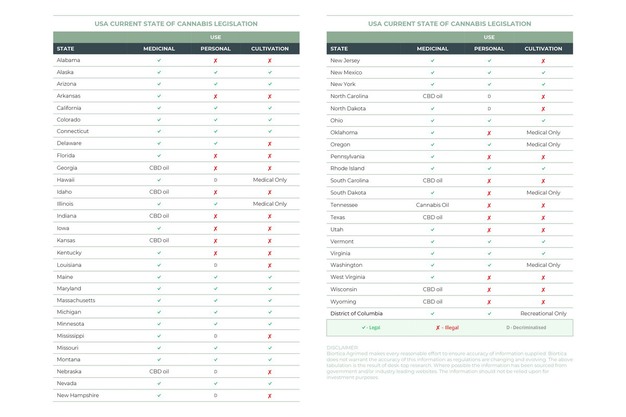Momentum is gathering around the world to regularize the use of cannabis. Nowhere is this more evident than in the recent announcement by US President Joe Biden to consider legalization of cannabis at a Federal level, where cannabis use, whether for medicinal purposes or adult use, is currently still illegal.
Tom Varga, CEO of Biortica said: "The May 17 announcement of the commencement of the US legislative process confirms his commitment to rescheduling cannabis from a Schedule 1 drug to a Schedule 3 drug. This is the start of a process to legalize cannabis at a Federal level and align it with the position already adopted by the vast majority of States in the USA."
"Until now, the regulation of cannabis in the USA has been undertaken on a state-by-state basis, resulting in a lack of consistency across the country in terms of issues such as safety, taxation and licensing. The Federal Government's embargo has meant that the transporting of cannabis across state lines and exporting product is currently a breach of Federal law and could constitute trafficking a Schedule 1 narcotic," he said.
"Of the 50 states in the USA, all have legalized the use of cannabis for either medicinal or oil-based use. Of those, 7 states have limited their acceptance by decriminalizing its use only, 25 states have legalized its use for medicinal purposes only, while 25 states have legalized adult use," he said.
Mr Varga said, "As the market and global perceptions of cannabis mature, we are witnessing the countries that pioneered its acceptance as a consumable product, start to reflect on their journey so far and correct some of the errors they made in the past. With the benefit of hindsight, we are witnessing legislators all over North America resetting their regulatory framework to give effect to their intended regulatory purpose – consumer safety, sustainable taxation revenue and preventing criminal elements from entering the market."
He went on to say, "As a first step, and given each of the 50 states' support the industry to date, is that the Federal government look to decriminalize the use of cannabis. The next step will be to work with the states to develop an over-arching national framework that gives effect to the regulatory purpose in a consistent set of rules. For example, Idaho allows CBD products, but only if they contain no THC. In Alabama there's currently no definition of a 'personal' quantity of THC, so, technically, any amount of THC, irrespective of how small a trace is found, could result in a jail term. Then there's Texas. Although medicinal cannabis is considered legal there," he said "there is a 1% THC limit. For perspective, most cannabis sold in the US market today contains 15+% THC with high yielding strains containing significantly higher levels."
"Disjointed and inconsistent legislation ultimately harms the community," said Varga.
He went on, "Australia needs to learn from these overseas experiences. We are lucky to have adopted a Federal approach from the outset. We have had the benefit of hindsight and our legislators and regulators have taken a slow and steady approach with a view to getting the settings right. As demand for cannabis products has scaled up, the Australian legislative and regulatory framework will be tested and we need to be ready to respond to those tests in a timely manner."
"We look forward to continuing to share our global industry research with the Australian industry, our legislators and regulators, to build an industry that we can all be proud of, an industry that puts patient care, safety and outcomes to the fore," said Mr Varga.
For more information:
Biortica Agrimed![]()
www.biortica.com
Sign up for our daily Newsletter and stay up to date with all the latest news!
Subscribe I am already a subscriber